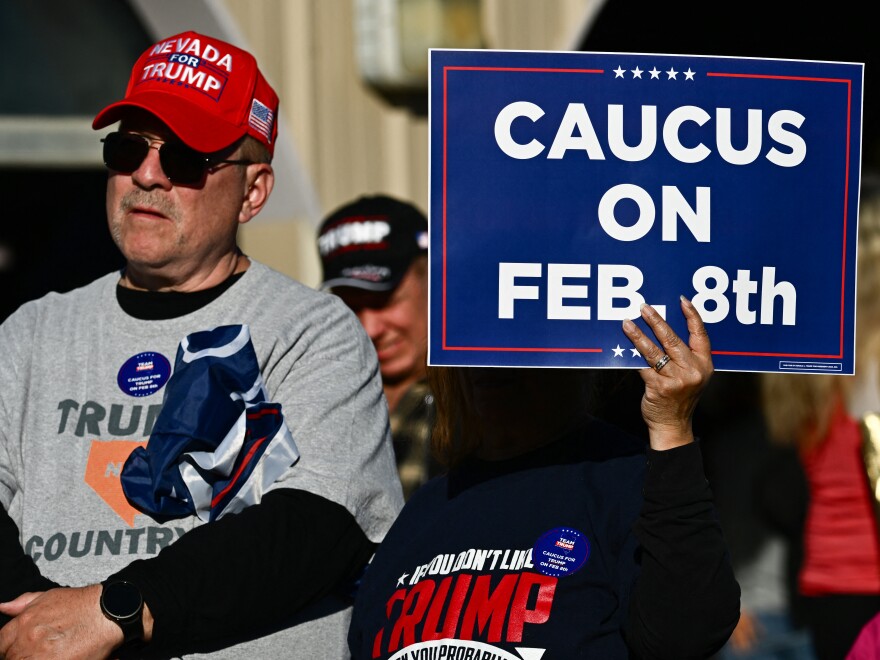Updated February 7, 2024 at 12:11 PM ET
One of the more unusual presidential contests is taking place in Nevada this week when the state's Republican Party holds a caucus on Thursday — just two days after the state held its primary election.
In the Democratic presidential primary, President Biden won the night. The incumbent was expected to win the state easily without any real challengers on the ballot.
On the Republican side, though, things were a little more interesting, in part because a new primary and caucus system that left voters confused and frustrated. In the GOP contest Tuesday, former U.N. Ambassador Nikki Haley, the only major candidate left on the primary ballot, lost the election to "none of these candidates," one of the options available for voters to select.
Austin Vick, a Republican primary voter at the polls on Tuesday, had wanted to cast his ballot for former President Donald Trump.
"Yeah, it's strange we can't write Trump in," he told NPR. "That's who I would be voting for. I don't want to vote for any of the candidates."
Since he couldn't cast a vote for Trump on Tuesday, Vick says he plans to go to Thursday's caucus to do just that.
Looking ahead to Thursday
The reason there are two contests this week is because Republicans in the state aren't happy with somewhat-recent changes to Nevada election laws.
In 2021, the state's Democratic governor at the time, Steve Sisolak, signed a slew of bills into law creating all-mail elections, expanding voter registration and moving the state-run presidential contest to a primary.
A caucus is a more restrictive voting system than a primary. A caucus requires voters to show up on a specific day at a specific time to cast a ballot, which can make it harder for shift workers and people with small children, for example, to vote. That small voting window can also make caucus turnout pretty unpredictable.
Nevada Democrats, in particular, began urging state lawmakers to move away from its caucus system to a primary system after the 2020 election. Voting access and higher voter participation were key arguments behind the effort.
Once the effort was successful, Republicans in the state began pushing back.
At first, the party filed a lawsuit arguing that the state's new laws infringed on its right to decide how to choose and bind the party's delegates in a presidential nominating contest. A court eventually found that the party would be unlikely to stop the state from moving to a primary system. It also ruled, though, that the party couldn't be bound by the state's laws when it comes to how it picks delegates.
So the Nevada GOP decided to drop the lawsuit and set up its own caucus to choose delegates. While Nevada held its primaries on Tuesday (Feb. 6), the GOP caucus will be Thursday (Feb. 8).
The Nevada Republican Party said in a statement it was affirming "its commitment to transparent elections with common-sense safeguards such as Voter ID, paper ballots, and precinct-based balloting" in its caucus.
And as part of the party's "protest" of the state-run primaries, members also made a rule that any presidential candidate participating in the primary cannot run in the caucus and is therefore unable to win any Nevada delegates for the presidential nomination. This is why Haley appeared on the GOP primary ballot, but won't be on the caucus ballot.
Only Trump and Texas businessman Ryan Binkley, who's mounting a longshot bid, remain on the ballot in the Nevada GOP caucus — a setup that all but ensures Trump wins the delegate haul. (The state Republican chair has told people to caucus for Trump.)
"This protest is designed to ensure no Republican candidates for President register for the state run election," party officials said in a statement, "negating the need for the same and saving the State of Nevada millions of taxpayer dollars."
Cau(cu)sing confusion

But this protest from the GOP has left its voters with a confusing pair of elections to vote in.
A spokesperson for the Nevada secretary of state's office said they have been hearing from voters who have questions about the primary and caucus.
"It's been a top issue we've received questions on in the last month," the spokesperson told NPR in a statement. "Specifically, we are receiving questions about why former President Trump is not on the primary ballot."
The secretary's office has said they are directing voters to the Nevada Republican Party when they have questions about the caucus.
And party officials have been defending their move.
"The caucus is the traditional way we have chosen our presidential nominee for decades," the party says on an information sheet for its voters. "Contrary to reports that the NVGOP is trying to confuse Nevada Republican voters, the truth is that the 2024 primary is an all new, very expensive, and meaningless process."
And at least some of the Republicans out at the polls on Tuesday, like Pat Rapaccuiolo, plan to vote again on Thursday.
"I wanted to vote for [Trump] period," she emphasized. "But I will anyway. Sooner or later he'll get my vote."
And she will. Rapaccuiolo plans to find her caucus site and show up Thursday to vote for Trump. There is no law prohibiting registered Republicans from voting in both the primary Tuesday and the caucus on Thursday.
Copyright 2024 NPR. To see more, visit https://www.npr.org.




